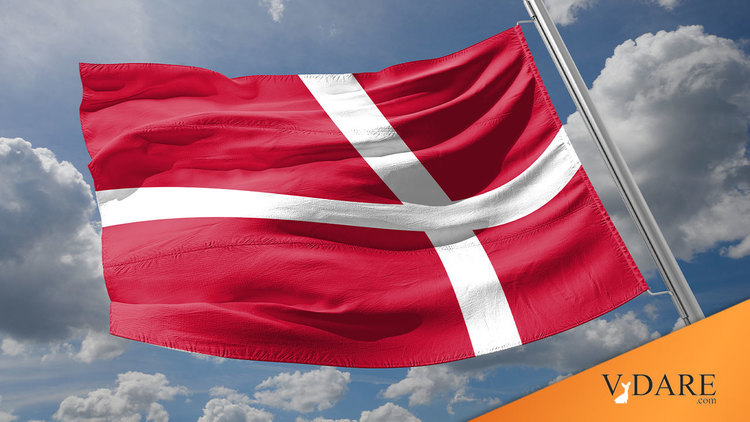


09/11/2011
The key phrase in this column that claims the Danish People’s Party will be less influential is "Such a shift probably won’t change the country’s immigration laws — none of the major parties favor loosening them … "
Doesn’t that mean that now all the parties in Denmark are Danish people’s parties? That means that the nationalists and patriots win their basic aim of keeping Denmark Danish, even if they don’t get Cabinet posts or whatever you get in the Danish political system.
If for some reason they don’t like nationalist third parties, all the mainstream parties have to do is be normally patriotic themselves. I wrote a while back that if
"[M]ajor parties don’t like the "far right" they need to stop censoring normal attitudes toward immigration. See, for example, How PC Boosts Le Pen, By Theodore Dalrymple, City Journal, April 25 2002, The subhead is "The French demagogue won by addressing reasonable concerns about Arab immigration and French identity that other politicians ducked." And if any major party will do something about immigration, as Sarkozy has promised to do, then they'll get a lot of support.
Le Pen has always been something of a fringe character, but for immigration skeptics he was the only game in town. To the extent that Sarkozy took away his votes, he did so by adopting Le Pen style policies."
That’s what’s happening in Denmark.
Nationalist party’s influence waning in DenmarkBy JAN M. OLSEN
Associated Press
One of Europe’s most influential anti-immigration parties could lose its leverage in Danish politics in next week’s election.
Polls ahead of the vote Thursday show that the Danish People’s Party stands to lose the kingmaker role which for 10 years has given it an important say on government policy, including pushing through sharp restrictions on immigration.
[Sob story omitted]
Since the Liberal-Conservative minority government took power in 2001, it depends on Kjaersgaard’s backing to push budget proposals and other bills through parliament.
As a result, Denmark’s asylum rules are now among Europe’s strictest, reducing the number of refugees seeking shelter in the country of 5.6 million people from nearly 13,000 in 2001 to just over 5,000 last year.
"In the past 10 years we have been able to tighten the immigration laws, and instead we get more people who come here to work and study," said Peter Skaarup, deputy leader of the Danish People’s Party. "We believe we still have a ways to go."
But many voters say they are fed up with the party’s polarizing language about Muslim immigrants — from countries including Pakistan, Iran, Iraq and Afghanistan — whom it accuses of leeching off the welfare system while failing to adopt Danish norms.
Election campaigns have not focused on immigration, but on how to revive Denmark’s sluggish economy amid the European debt crisis. The government has been forced to downgrade its growth forecast for this year, and projects budget deficits of 3.8 percent of gross domestic product in 2011 and 4.6 percent in 2012.
Most polls indicate the Danish People’s Party will only lose a few of its 24 seats in the 179-member Parliament. But the government appears likely to lose power to a left-wing opposition bloc led by Social Democratic leader Helle Thorning-Schmidt, who has ruled out teaming up with the Danish People’s Party.
"This means the Danish People’s Party could become politically uninteresting when in the opposition and they will not have any influence," said political science professor Kasper Moeller Hansen of the University of Copenhagen.
Such a shift probably won’t change the country’s immigration laws — none of the major parties favor loosening them — but would affect Denmark’s overall politics.
"In the past 10 years they have polarized the debate, because they focused so much on Muslims," said Mustafa Gezen, the spokesman of the Danish Muslim Council. "That puts an unnecessary focus on 200,000 people in Denmark. Most are really working to give something to Danish society."
The election outcome could also affect Denmark’s image abroad — reducing the negative headlines in Europe and beyond that the party has produced.
Earlier this year, the party pushed through a plan to reinstate customs checks at Denmark’s borders with Germany and Sweden — a move that drew sharp protests from Germany and the European Union. The EU said Denmark was violating the spirit, if not the letter, of EU rules on free movement for goods and people.
The opposition says it will revoke the border plan if it can form a government.